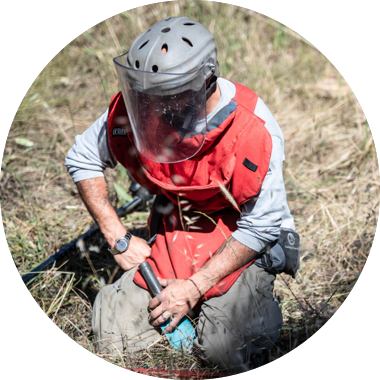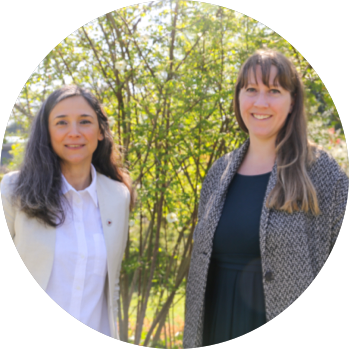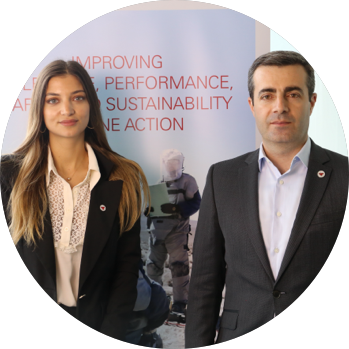01
Foreword
Since 1998, the GICHD has been working towards reducing risks to communities caused by explosive ordnance. Helping to develop and to professionalise mine action and ammunition management for the benefit of mine-affected regions is our shared commitment.
Read more
In 2021 the GICHD supported 43 countries and territories – thanks to contributions from 27 donors. COVID-19 pandemic-related restrictions radically changed the way we were able to deliver our services, with digital and remote becoming new key words. Such adaptations were challenging, yet they further solidified the Centre’s capacities. Thus, remote support will complement more traditional modes of intervention also in the post-pandemic reality.
Strengthening our partners’ knowledge and skills base is one of our fundamental commitments. This support has been provided in various forms and across the Centre’s manifold areas of expertise. Our needs-driven approach ensures that our support builds on detailed needs assessments, thus assuring tailored, effective and efficient responses to specific challenges.
The GICHD devotes significant resources to research and development, generating knowledge, good practice guidelines, and tools constituting the basis for constant improvements and effective actions. Some research and development products are of global relevance; of particular mention – the Guide to Explosive Ordnance Pollution of the Environment as well as the Guide on homemade explosives. Other research focuses on specific countries such as, for example, case studies on the contribution of mine action to sustainable development in Cambodia and Colombia or specific themes, such as gender and operational efficiency, information management, and explosive ordnance risk education.
The GICHD continues to support the implementation of international humanitarian law conventions by providing expert input and helping to develop global standards in both mine action and ammunition management. Moreover, the Centre’s expertise is an intrinsic part of policy processes relating to conventional arms and ammunition. Thus, the United Nations General Assembly-mandated Group of Governmental Experts tasked to examine problems arising from the accumulation of conventional ammunition stockpiles in surplus, was able to conclude its work in September 2021 with a consensus report and recommendations. Finally, the GICHD continues to promote dialogue and cooperation at the regional level through its regional cooperation programmes, disseminating good practice, key tools and resources adapted to regional needs.
Working towards our goal of a mine-free world would not be possible without the support of our donors and without the expertise and commitment of our co-workers. Our sincere thanks to each and every one.

Dr Barbara Haering
President of the Council of Foundation

Ambassador Stefano Toscano
GICHD Director
02
Results at a glance
1. National strategies are developed, adopted and implemented by states, according to good practice
National strategies are developed, adopted and implemented by states, according to good practice
- 3 mine action strategies developed in line with good practice: Afghanistan, Germany (GFFO), Iraq
- 1 mine action strategy formally approved by government: Germany (GFFO)
- 1 mine action strategy revised: Zimbabwe
- 4 mine action strategies implemented: Germany (GFFO), Kosovo, South Sudan, Zimbabwe
- 2 mine action strategy assessments conducted: Iraq, Sri Lanka
- 3 mine action strategies included gender and diversity considerations: Afghanistan, Germany (GFFO), Iraq
2. National standards are developed, adopted and implemented by states, according to international standards
National standards are developed, adopted and implemented by states, according to international standards
1 NMAS needs assessment completed: Ukraine
4 NMAS reviewed and updated: Angola, Cambodia, Ukraine, Vietnam
1 NMAS-related IED response updated: Yemen
6 workshops delivered for 143 participants (36 women, 107 men):
- Liability (Afghanistan)
- Risk management; ADS outreach (Angola)
- NMAS, IMAS (Ukraine)
- Risk management capacity assessment (Vietnam)
1 publication: Liability in Mine Action
3. States and other partners use quality information to support their programming and operational management
States and other partners use quality information to support their programming and operational management
4 states improved their IM capacity score as per the GICHD's IM capacity development framework: Colombia, Lebanon, Tajikistan, Yemen
8 baseline assessments conducted: Armenia, Azerbaijan, Colombia, Lebanon, Libya, Serbia, Tajikistan, Yemen
6 states, 18 partners adopted the GICHD-produced IMSMA Core tools: Cambodia, Lebanon, Libya, Tajikistan, Ukraine, Yemen; UNMAS programmes (Abyei, Afghanistan, Burkina Faso, CAR, Colombia, Cyprus, DRC, Iraq, Libya, Mali, Nigeria, Palestine, Somalia, South Sudan, Syria, Western Sahara), UNMAS HQ and Mayday Rescue for Syria
1 state, 1 partner incorporated humanitarian datasets into their IM system: Yemen (using dataset from the Armed Conflict Location & Event Data Project (ACLED)); UNMAS (sharing security incidents data)
2 training courses; 4 workshops delivered for 68 participants (17 women, 51 men); 2 e-learning courses launched
- IMSMA Core, NG Administrator (online)
- Information system for mine action workshop (Iraq)
- IMSMA Core and IM technical support workshop (Lebanon)
- Basic Mobile Data Collection with Survey123 (online)
- Introduction to GIS for Mine Action, ArcGis Enterprise (e-learning courses)
4. Land release is implemented by states and other partners, according to good practice
Land release is implemented by states and other partners, according to good practice
4 tools developed: MACRA, CORD, equipment e-catalogue, Technical Simulator
2 baseline assessments completed: Armenia, Ukraine
Ukraine improved their land release operations as per GICHD's assessment framework
10 training courses; 2 workshops delivered for 190 participants (44 women, 146 men)
- NTS (Global, Ukraine, EECCA RCP)
- Quality Management (Iraq, EECCA RCP, Balkans)
- TS (regional, ARCP)
- Ops Analyst
- Ops Efficiency (EECCA RCP)
- CE validation workshop
- Mine action technology workshop
3 publications:
- Guide to EO Pollution of the Environment
- HME Guide
- Community Engagement
5. Regional cooperation furthers the exchange, dissemination, and adoption of good practice
Regional cooperation furthers the exchange, dissemination and adoption of good practice
21 NMAAs/programmes exchanged good practice through regional cooperation: Armenia, Azerbaijan, Benin, Burkina Faso, Croatia, Democratic Republic of Congo, Georgia, Iraq, Jordan, Lebanon, Libya, Mali, Mauritania, Niger, Palestine, Senegal, Somalia, Sudan, Tajikistan, Togo, Ukraine
20 NMAAs/programmes adopted good practice: Armenia, Azerbaijan, Benin, Burkina Faso, DRC, Georgia, Iraq, Jordan, Lebanon, Libya, Mali, Mauritania, Niger, Palestine, Senegal, Somalia, Sudan, Tajikistan, Togo, Ukraine
1 partnership established with Francophonie Division FDFA
6 IMAS; 1 publication; 3 training packages translated in national/regional languages:
- IMAS (Arabic, French, Russian)
- IEDD Clearance Good Practice (Arabic, French)
- IED GSA handbook, Chapter 4 of the Guide (Russian)
- OE training package (Russian)
- QM training package (Russian)
- NTS training package (Russian)
6. Risks from explosive ordnance are reduced in a gender and diversity sensitive and responsive manner
Risks from explosive ordnance are reduced in a gender and diversity sensitive and responsive manner
5 GD assessments completed: Lebanon; DRC Afghanistan, DRC Colombia, DRC Iraq, DRC Ukraine
1 NMAA, 2 partners equipped with dedicated capacity on GD: Sudan; DCA Lebanon, NPA Iraq
Lebanon formalised GD mainstreaming frameworks and improved GD responsive systems and practices
3 training courses developed; 1 training course delivered for 17 participants (11 women, 6 men); 4 workshops organised:
- GFP programme (Global, online, workshop)
- Introduction to GD in mine action (eLearning French)
- Introduction to EORE Essentials e-learning
- DRC HQ workshop
- EORE/SBCC workshop
- EORE workshop for the Cambodian Mine Action Authority (CMAA) (online)
82% of participants applied new knowledge and skills
5 global EORE policy documents, strategies, and plans or agendas produced or adapted
21 countries/partners adopting methods, tools or approaches developed, promoted or shared by the EORE AG and the GICHD
1 article in the Journal of CWD on Mental Health in Mine Action
1 study on Gender and Operational Efficiency conducted (to be published in 2022)
7. Ammunition is managed by states according to good practice
Ammunition is managed by states according to good practice
2 SSMA baseline assessments completed: Peru, Togo
1 state, 2 partners assisted in improving the SSMA based on good practice: Equatorial Guinea; European Union, DDPS
Moldova made ammunition stocks safer and more secure in line with good practice in the IATG
7 IATG training courses delivered; 2 training courses developed; 3 IATG seminars to which AMAT has contributed:
- IATG-awareness (5 online, Peru)
- DDR WAM (by UNODA/UNDPO)
- MSAG ammunition
- STM (for UNOPS)
- IATG training programme
- Seminar for ITF (Kyrgyzstan)
- Seminar for US EUCOM (Estonia, Kosovo)
15 ammunition experts (1 woman, 14 men) validated by the United Nations (UN) SaferGuard Programme
3 publications:
- Journal of Conventional Weapons Destruction (article)
- Counter IED report (article)
- AMAT insights
8. Implementation of Conventions is fostered through the provision of expertise and logistical support
Implementation of Conventions is fostered through the provision of expertise and logistical support
26 references to the GICHD’s substantive and logistical support
6 extension requests supported by the GICHD:
- APMBC (Democratic Republic of Congo, Mauritania, Somalia, Turkey)
- CCM (Afghanistan, Mauritania)
Mauritania is subject of an individualised and country-based approach (APMBC/CCM) supported by the GICHD
9. Relevant concepts, methods and tools are captured in international standards
Relevant concepts, methods and tools are captured in international standards
2 new IMAS, 2 TNMAs approved by the IMAS Review Board
- IMAS 01.10, 13.10
- TNMAs on ARE, KPIs
3 revisions to standards/technical notes for mine action (TNMA) submitted for considerations:
- Competency Frameworks T&EPs on EOD and IED
- IMAS 09.30
100% of new standards/TNMAs approved by the IMAS Review Board are gender and diversity sensitive
1 training course conducted for 20 participants (5 women, 15 men); 1 development of the IMAS e-learning:
- IMAS outreach (Ukraine)
- IMAS e-learning
10. International normative and policy processes are informed by evidence
International normative and policy processes are informed by evidence
3 international and policy processes that received advice
- GGE report
- 7th Biennial Meeting of States of the Programme of Action on SALW (side-event)
- 7th Conference of the States Parties of the ATT (presentation)
5 references to GICHD’s expertise
11. The reduction of risks from explosive ordnance contributes to humanitarian action and sustainable development
The reduction of risks from explosive ordnance contributes to humanitarian action and sustainable development
5 cross-thematic partnerships with gender equality, humanitarian, peace, security and development stakeholders:
- UNDP handbook on capacity development
- Peer discussion 'Keeping Gender on the Agenda' (IGC network)
- Podcast on inclusive peace in Colombia (GPW)
- Intervention at Ukraine gender mainstreaming conference (UNDP)
- GICHD established a new partnership with the University of Geneva (GTI initiative), delivered a session and hosted a GTI student as an intern for 6 months
16 interventions in external training courses and policy debate
6 tools adapted under EGIS for peace monitoring in Ukraine and systems-based IM approach
2 case studies on the links between mine action and gender equality, humanitarian action, peace, security, and development:
- Cambodia
- Colombia
03
A focus on
Leaning in to the digital age
Over the course of 2021, the GICHD continued to strengthen and adapt its broad approach to innovation across work areas:
Training digitally across the globe
Accessibility and adaptation helped the GICHD continue global capacity-building efforts. In 2021, the Centre reached over 2,190 learners from 80 countries through mixed training formats: self-paced, virtual or in-person instructor-led, and blended courses. Continual improvements are in development to scale up digital learning and enhance accessibility through the new learning management system to be launched in 2022.
Fostering technological advances
Through our 8th Mine Action Technology Workshop in 2021, the GICHD brought together 203 developers, researchers, national authorities, commercial enterprises and operators from 38 countries to advance the use of technology in three key areas: land release, explosive ordnance risk education (EORE), and information management systems. This is a rare opportunity for technological innovators and mine action experts from around the world to exchange ideas and expertise to promote innovation.
Innovating for better outcomes in communities
Field trials in Cambodia in 2021 gave promising results, showing that the Swiss Mine Action Reduction Tool (SMART) system and technical survey dogs can help save lives and release land, getting people back on safe ground as quickly as possible without compromising safety. Using the innovative SMART kit, an intelligent backpack with a GPS, camera, speaker, and beacon drop system, trained dogs are guided by experts to identify mines. In tests facilitated by partners APOPO and Cambodian Mine Action Centre, over 2 million square metres have already been searched, with no explosive items being missed, a low level of false alarms, and zero accidents involving dogs or people. The GICHD developed this technology in partnership with Digger DTR.
The GICHD's commitment to sustainability
Environmental considerations around explosive ordnance risk reduction continue to gain ever-greater attention. The GICHD has contributed to research on the matter, with the publication in 2021 of a Guide to Explosive Ordnance Pollution of the Environment, seeking to raise awareness on the environmental harm caused by explosive ordnance. Rooted firmly in scientific research, the guide assists mine action operators in applying all reasonable effort to minimise the pollution of the environment while not unduly inhibiting the immediate need to remove the blast and fragmentation hazard to civilians. The issues for the environment are also integrated in Iraq’s 2022–2028 Mine Action Strategy, recognising the devastating impact that the climate crisis has in many affected countries and to consider the environmental implications of mine action operations.
This renewed focus on environmental considerations in mine action builds upon previous work done by the GICHD, including the publication of an article in the James Madison University journal under a ‘do no harm’ perspective: Do No Harm in Mine Action: Why the Environment Matters. Another, published by Oxford University Press, examines the negative environmental impact of remnants of conflict and discusses the normative framework and good practice aimed to ensure that clearance does not further create environmental harm: Post-Conflict Mine Action: Environment and Law - Oxford Scholarship.
Showing the GICHD's strong commitment to reducing its environmental impact as set out in its Environmental Policy, the GICHD joined the 2050Today Initiative in 2021, which brings together a community of international institutions based in Geneva committed to ensuring a quick, continuous and measurable reduction of greenhouse gas emissions from their own institutions. By joining the 2050Today Initiative, the GICHD commits to reducing its greenhouse gas emissions in a concrete, measurable and visible way: every year by 5%, at least a 50% reduction by 2030 and to reach net zero emissions by 2050.

04
Beneficiary countries and territories
In 2021, the GICHD supported national authorities, international and regional organisations and NGOs in 43 countries and territories.
The GICHD adapted to the COVID-19 pandemic by increasing its remote support. However, when in-person contact was deemed essential and destinations were accessible, GICHD staff travelled to provide on-site support, liaise with partners and donors, and organise workshops and training courses.
| Title | Latitude | Longitude | Description |
|---|---|---|---|
| Afghanistan | 34.52982871 | 69.17238745 |
|
| Angola | -12.28601411 | 17.67407767 |
|
| Armenia | 40.18294407 | 44.51733362 |
|
| Azerbaijan | 40.36590966 | 48.06707879 |
|
| Benin | 9.668767798 | 2.426891184 |
|
| Bosnia and Herzegovina | 44.58778453 | 17.74539415 |
|
| Burkina Faso | 12.46351616 | -1.755471132 |
|
| Cambodia | 12.81514143 | 105.1059361 |
|
| Central African Republic | 6.643944723 | 20.61330472 |
|
| Croatia | 45.09566453 | 14.88860369 |
|
| Colombia | 3.798903704 | -73.14739741 |
|
| Cyprus | 35.04842395 | 33.23828739 |
|
| Georgia | 42.18432796 | 43.48560558 |
|
| Germany | 51.11751548 | 10.29693198 |
|
| Iraq | 33.15856911 | 43.02322926 |
|
| Jordan | 31.34487257 | 36.74655209 |
|
| Kosovo | 42.65107936 | 20.86850807 |
|
| Lao People’s Democratic Republic | 19.67434572 | 102.4168213 |
|
| Lebanon | 34.11129845 | 35.87966087 |
|
| Libya | 27.09487216 | 17.27397533 |
|
| Mali | 17.92133393 | -1.781481732 |
|
| Mauritania | 20.19842838 | -10.70085053 |
|
| Niger | 17.58793708 | 9.318582737 |
|
| Nigeria | 9.721935924 | 7.93680348 |
|
| Palestine | 31.51383496 | 34.47601896 |
|
| Papua New Guinea | -6.630010353 | 144.2883229 |
|
| Senegal | 14.34059835 | -14.44295052 |
|
| Serbia | 44.14179294 | 20.97457225 |
|
| Solomon islands | -9.647921021 | 160.1316407 |
|
| Somalia | 2.864076392 | 45.25653142 |
|
| South Sudan | 7.599270543 | 30.20762455 |
|
| Sri Lanka | 7.579561453 | 80.93385864 |
|
| Sudan | 16.37336395 | 30.48233675 |
|
| Syrian Arab Republic | 35.01057063 | 38.5828885 |
|
| Tajikistan | 38.55376055 | 70.9933891 |
|
| Thailand | 15.42962598 | 101.3447021 |
|
| Togo | 8.669073151 | 1.005120955 |
|
| Turkey | 39.03564534 | 35.34638729 |
|
| Ukraine | 49.0286344 | 31.62897982 |
|
| Vietnam | 14.58134726 | 108.4015121 |
|
| Western Sahara | 24.71872496 | -13.17492442 |
|
| Yemen | 15.91626129 | 47.50427845 |
|
| Zimbabwe | -18.95832542 | 30.2268197 |
|
05
2021 Stories
06
Finance overview
All amounts in CHF
Expenditures and Revenues Statement 2021
Operations
| Publications and outreach | 342,508 |
| Travel costs | 380,864 |
| Professional fees (events & consultants) | 3,830,250 |
| Travel costs for third parties | 254,105 |
Staff
| Personnel expenses | 11,349,801 |
General sevices
| ICT and furniture maintenance | 0 |
| ICT and furniture acquisitions | 324,542 |
| ICT running costs | 333,572 |
| Office supplies | 18,521 |
Miscellaneous
| Miscellaneous expenses | 717,540 |
| In-kind expenditures | 581,825 |
Total direct expenses: 18,133,528
Financial results
| Financial results | 294,912 |
Total expenditures: 18,428,440
Contributions
| Contributions received | 17,102,332 |
| Activities / contributions deferred to next year | (1,239,177) |
| Activities / contributions deferred from previous year | 1,991,256 |
Total contributions for the year: 17,854,411
Other income
| Miscellaneous income | (7,796) |
| In-kind contributions | 581,825 |
Total revenues: 18,428,440
07
Donors
The GICHD is thankful to all contributors who make its work possible. In 2021, the Centre benefitted from core contributions, project funding and in-kind support from 27 governments and organisations.
In-kind contributions from governments and organisations: Esri, Information and Communication Technology and the Swiss Federal Department of Defence, Civil Protection and Sport (DDPS).

















